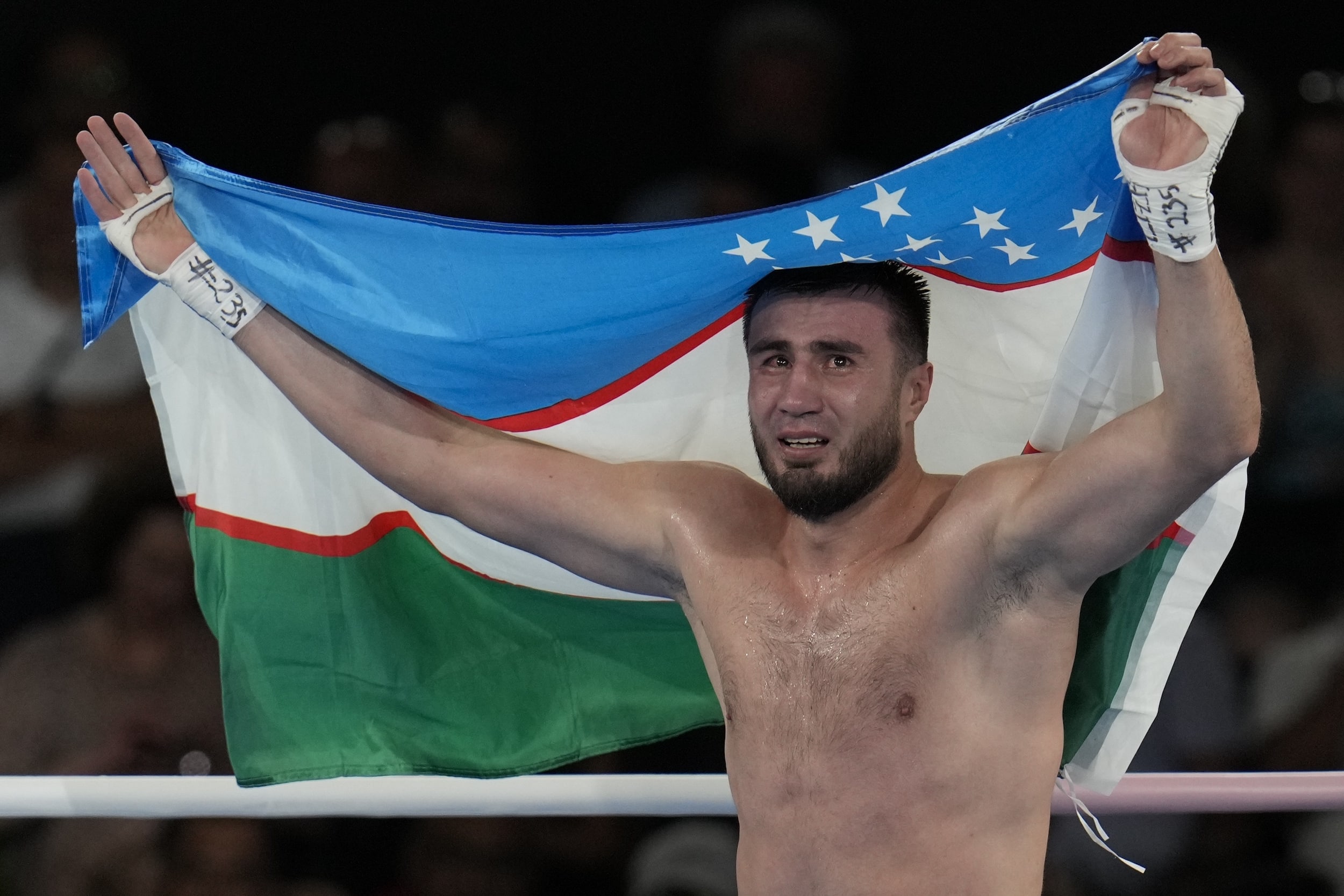
Uzbekistan’s Bakhodir Jalolov celebrates after defeating Spain’s Ayoub Ghadfa in their men’s +92 kg final boxing match at the 2024 Summer Olympics, Saturday, Aug. 10, 2024, in Paris, France. (AP Photo/Ariana Cubillos)
PARIS — Uzbekistan’s beloved head boxing coach was revived from apparent cardiac arrest Thursday by two members of Britain’s training staff after celebrating his team’s first gold medal of the Paris Olympics, his fighters confirmed Saturday night.
The Uzbek team went on to win five golds — more than any Olympic team in the last 20 years — in tribute to Tulkin Kilichev, who is recovering in a Paris hospital.
“(Kilichev) is more than a coach or a father, in fact,” Bakhodir Jalolov said after winning his second super heavyweight gold medal. “He has raised us. He educated us. He has transmitted the sports spirit to us. He has been with me in my heart, and tomorrow we will be going to visit him in the hospital.”
READ: Samoa boxing coach dies at Paris Olympics village
Kilichev fell ill backstage after flyweight Hasanboy Dusmatov won Uzbekistan’s first gold medal Thursday. According to GB Boxing, team doctor Harj Singh and physical therapist Robbie Lillis found Kilichev in life-threatening distress. They performed CPR on the coach, and Lillis also used a defibrillator, the team said.
Jalolov said Kilichev remained in contact with the team over the past two days while recovering, and his fighters responded with a historic performance.
Jalolov was the last of Uzbekistan’s five Paris champions to climb the podium Saturday night in the best Olympic performance since Cuba also won five golds at the 2004 Athens Games. Uzbekistan won the final five men’s gold medal bouts contested at Roland Garros, starting with Dusmatov on Thursday — a victory followed by that frightening moment for Kilichev.
“This is history for Uzbekistan, and I’m emotional because becoming a two-time Olympic champion was my dream,” Jalolov said. “Now I feel very happy, and I will continue my career as a professional boxer.”
Lazizbek Mullojonov won the heavyweight title Friday night, joining a remarkable Olympic lineage at that weight including Joe Frazier, George Foreman, Teofilo Stevenson, Felix Savon and Oleksandr Usyk.
READ: Lin Yu-ting wins Olympic boxing gold amid gender controversy
“We are building a new generation of boxers,” Mullojonov said. “This is the result of all the federation’s work.”
Indeed, Uzbekistan has responded sharply to its twisting fortunes in the past two Games under Kilichev’s leadership. The team claimed three gold medals in Rio de Janeiro in 2016 to signal its arrival as an international power, but won just one gold medal — Jalolov’s first — five years later in Tokyo.
With Jalolov and Dusmatov returning alongside a new crew of gifted young boxers, Uzbekistan has returned to dominance.
In fact, one of the Uzbeks’ most impressive fighters didn’t even medal: Light heavyweight Turabek Khabibullaev looked like a star even while losing a tough 3:2 decision to two-time Olympic gold medalist Arlen Lopez of Cuba in the quarterfinals.
Jalolov is the first repeat champion at a weight with gold-medal alumni including Lennox Lewis, Wladimir Klitschko, Alexander Povetkin and Anthony Joshua, who was among the fighters Jalolov suggested he would like to fight next as a pro.
Jalolov trounced Spain’s Ayoub Ghadfa 5:0 in the final fight of the tournament. He earned his fourth straight shutout victory in Paris with an ease that was actually not very surprising for a 30-year-old professional heavyweight with a 14-0 record going against much less experienced foes.
But Jalolov is a three-time Olympian who loves fighting for his country more than he likes fighting for himself. After putting his pro career on hold to chase another gold medal, he claimed it rather comfortably in Paris, only being seriously tested by Australia’s Teremoana Teremoana in the quarterfinals.

